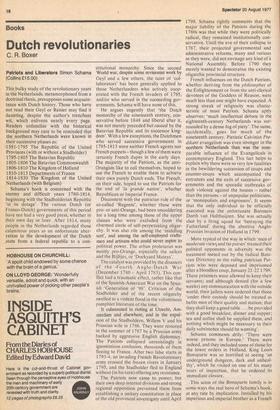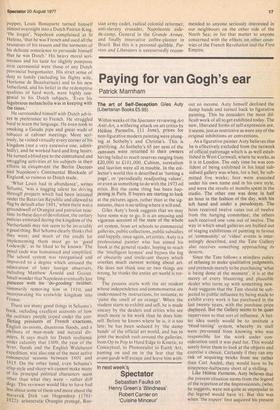Books
Dutch revolutionaries
C. R. Boxer
Patriots and Liberators Simon Schama (Collins £15.00)
This,bulky study of the revolutionary years in the Netherlands, metamorphosed from a doctrinal thesis, presupposes some acquaintance with Dutch history. Those who have not read their Geyl or Renier may find it daunting, despite the author's trenchant wit, which enlivens nearly every page. Readers unfamiliar with the historical background may care to be reminded that the northern Netherlands were known in their successive phases as: 1581-1795 The Republic of the United Provinces (with or without a Stadholder) 1795-1805 The Batavian Republic 1805-1806 The Batavian Commonwealth 1806-1810 The Kingdom of Holland 1810-1813 Departments of France 1814-1830 The Kingdom of the United Netherlands (with Belgium) Schama's book is concerned with the stormy and difficult years 1780-1814, beginning with the Stadholderian Republic 'in its dotage'. The various Dutch (or Franco-Dutch) governments of this period have not had a very good press, whether in their own day or later. After 1814, many people in the Netherlands regarded those calamitous years as an unfortunate aberration in the development of the Dutch _state from a federal republic to a con stitutional monarchy. Since the second World war, despite some revisionist work by Geyl and a few others, the taint of 'collaborators' has been generally applied to those Netherlanders who actively cooperated with the French invaders of 1795, and/or who served in the succeeding governments. Schama will have none of this.
He argues cogently that the Dutch monarchy of the nineteenth century, conservative before 1848 and liberal after it, was not merely preceded but caused by the Batavian Republic and its successor kingdom'. With a few exceptions, the Dutchmen who served successive governments in 1795-1813 were neither French agents nor French puppets —though a few of them were certainly French dupes in the early days. The majority of the Patriots, as the antiOrangists like to call themselves, hoped to use the French to enable them to achieve their own purely Dutch ends. The French, on their side, hoped to use the Patriots for the end of 'la grande nation', whether Republican or Imperial France.
Discontent with the patrician rule of the so-called 'Regents', whether these were proor anti-Orange, had been smouldering for a long time among those of the upper classes who were excluded from the charmed circle of self-perpetuting oligarchy. It was also rife among the 'middling sort', and among the self-employed craftsmen and artisans who could never aspire to political power. The urban proletariat was mostly pro-Orange, especially the sailors and the Bijltjes, or 'Dockyard Mateys'.
The catalyst was provided by the disasters of the 'Fourth Anglo-Dutch War (December 1780 — April 1783). This conflict had a traumatic effect, rather like that of the Spanish-American War on the Spanish 'Generation of '98'. Criticism of the Stadholder and of the recent oligarchy swelled to a violent flood in the voluminous pamphlet literature of the time.
It culminated in rioting at Utrecht, Amsterdam and elsewhere, and in the expulsion of the Stadholdern, Willem V and his Prussian wife in 1786. They were restored in the summer of 1787 by a Prussian army backed by aggressive English diplomacy. The Patriots collapsed unresistingly in ignominious confusion, thousands of' them fleeing to France. After two false starts in 1793-4, an invading French Revolutionary army crossed the frozen rivers in January 1795, and the Stadholder fled to England without (in his turn) offering any resistance.
The Patriots now came to power; but their own deep internal divisions and strong regional opposition prevented them from establishing a unitary constitution in place of the old provincial sovereignty until April 1798. Schama rightly comments that the • major liability of the Patriots during the 1780s was that while they were politically radical, they remained institutionally conservative. Until the eve of' their collapse in 1787, their projected governmental and administrative reforms, many and various as they were, did not envisage any kind of a National Assembly. Before 1790 they merely wanted to democratise the existing oligarchic provincial structure.
French influences on the Dutch Patriots, whether deriving from the philosophes of the Enlightenment or from the anti-clerical devotees of the Goddess of Reason, were much less than one might have expected. A strong streak of religiosity was characteristic of most Patriots. Schama aptly observes: 'much intellectual debate in the eighteenth-century Netherlands was surrounded by a dense fog of piety'. The same, incidentally, goes for much of the nineteenth century. Pietistic Calvinist Predikant evangelism was even stronger in the northern Netherlands than was the comparable influence of' the Evangelicals in contemporary England. This fact helps to explain why there were so very few fatalities in the bewildering succession of coups and counter-coups which accompanied the entrances and the exits of successive governments and the sporadic outbreaks of mob violence against the houses — rather than the persons — of unpopular politicians, or 'monopolists and engrossers'. It seems that the only individual to be officially executed was the unfortunate Baroness Dorth van Holthuijzen. She was actually shot by a firing squad for 'betraying the Fatherland' during • the abortive AngloPrussian invasion of Holland in 1799.
More typical of the way in which 'men of moderate views, and fat purses' treated their political opponents in adversity was the treatment meted out by the radical Batavian Directory to the rulfrig patrician Patriots who were deposed and imprisoned after a bloodless coup, January 21-22 1798. These prisoners were allowed to keep their servants; and although denied (for a few weeks) any communication with the outside world, their jailers were ordered that those 'under their custody should be treated as befits men of their quality and station; that they shall keep a good table . . . be provided with a good breakfast, dinner and supper; tea and coffee shall be supplied them, and nothing which might be necessary to their daily subsistence should be wanting'.
Schama comments drily: 'There were worse prisons in Europe. There were indeed, and they included some of those for the lower orders in Holland. King Louis Bonaparte was so horrified at seeing 'an underground dungeon, dark and unhealthy', which he visited on one of his many tours of inspection, that he ordered its immediate closure.
This scion of the Bonaparte family is in some ways the real hero of Schama's book, at any rate by implication. Installed by his imperious and imperial brother as a French
puppet, Louis Bonaparte turned himself almost overnight into a Dutch Patriot-King. 'He forgot', Napoleon complained at St Helena, 'that he was French and used all the resources of his reason and the torments of his delicate conscience to persuade himself that he was Dutch.' His heavy moral seriousness and his taste for sligittly pompous civic ceremonial were those of any Dutch provincial burgomaster. His strict sense of duty to family (including his flighty wife, Hortense de Beauharnais) and to his new fatherland, and his belief in the redemptive qualities of hard work, were highly congenial to his Dutch subjects. 'Even his lugubrious melancholia was in keeping with the times.' •
He surrounded himself with Dutch advisers itt preference to French. He struggled 'hard to learn the language. He even took to smoking a, Gouda pipe and great wads of tobacco at cabinet meetings. More seriously, he visited virtually every corner of his kingdom (not a very extensive one, admittedly), and he worked hard and long hours. He turned a blind eye to the contraband and smuggling activities of his subjects in their efforts to circumvent the Berlin Decrees and Napoleon's Continental Blockade of England, so ruinous to Dutch trade.
'What Louis had in abundance', writes Schama, 'was a nagging talent for driving through( projects which had been initiated under the Batavian Republic and allowed to flag by default after 1801; when there was a • groundswell of Orangist and patrician reaction. In these days of devolution, the unitary policies enforced during the kingdom of the Netherlands may not seem to be invariably a good thing. But Schama clearly thinks that they were; and much of the credit for implementing them must go to 'good Lodewijk', as he liked to be known. The penal code was humanised and simplified. The school system was reorganised and improved to a degree which aroused the admiration of later foreign observers, including Matthew Arnold and Guizot. Small wonder that Napoleon eventually lost patience with his 'do-gooding' brother, summarily removing him in 1810, and incorporating his erstwhile kingdom into France.
There are many good things in Schama's hook, including excellent accounts of how the ordinary people coped under the conflicting pressures of French exactions, English invasions, disastrous floods, and a Plethora of man-made and natural disasters. It says much for Dutch 'resilience under calamity that 1809, the year of the fever, floods and the English Walcheren expedition, was also one of the most active commercial seasons between 1801 and 1815. On the other hand, even Schama's crisp style and sharp wit cannot make many of his principal political characters seem Other than what they were — rather dull dogs. This reviewer would like to have had less abut some of them and more about the maverick Dirk van Hogendorp (17611822): aristocratic Orangist protege, Rus sian army cadet, radical colonial reformer, anti-slavery crusader, Napoleonic aidede-camp, General in the Grande Armee, and finally innovative coffee-planter in Brazil. But this is a personal quibble. Patriots and Liberators is unreservedly recom
mendedto anyone seriously interested in our neighbours on the other side of the North Sea; or for that matter to anyone concerned with the effects on, other countries of the French Revolution and the First Empire.
































 Previous page
Previous page